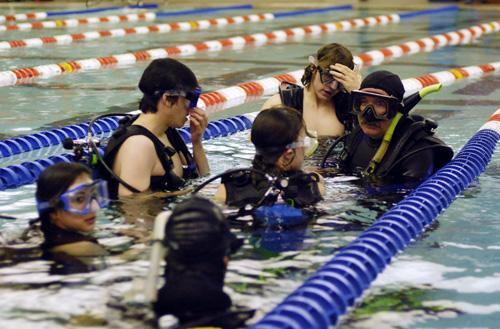Ready for spring break? Learn to scuba dive

Scuba instructor Brad Knop (right) goes over instructions before taking the class into the deeper section of the pool. Brennan Caughron
March 10, 2009
For two hours on Monday and Wednesday evenings, several students put on fins, masks, snorkels and regulators and dive into the water. However, on these dives, they do not see tropical fish or vibrantly colored coral reefs. Their somewhat less vibrant surroundings are lane markers and concrete.
These students are part of a three-week scuba clinic offered at the Activities and Recreation Center indoor pool that prepares them to become scuba-certified.
While the clinic has a classroom portion to go over the basics of scuba gear and safety, the focus of the course is hands-on learning in the pool, instructor Brad Knop said.
Up to 10 students are allowed in a session at a time, although the current session has only four. The limit is enforced to ensure that each student has access to equipment and individualized attention.
“I try to be more than fair with everyone in the class.” Knop said. “Everyone is different.”
Get The Daily Illini in your inbox!
Although the students may have different levels of experience with scuba diving, Knop requires that each participant be able to complete a 200-yard swim and 10 minutes of treading water to join the course.
As the four students set up and put on their equipment for their first dive, Knop encouraged them to remember what they had learned in the classroom portion.
“Don’t be intimidated by the equipment,” he said. “Just take your time and make sure everything is right.”
Once all of the students were prepared, Knop and two assistant instructors led the students into the shallow end of the pool to practice the techniques of breathing, swimming and the various hand signals used to communicate with other divers.
After they had learned the basics, Knop led them to the deepest part of the pool, at a depth of 13 feet 6 inches. He taught various other techniques, and then the students descended into the water to practice.
Max Menchaca, sophomore in LAS, said he had never been underwater with the scuba gear. He said his ears hurt during the dive, but that was just something he would have to get used to.
Menchaca wants to learn how to scuba dive before his trip to Curacao in May.
Brent Nelson, sophomore in LAS, said he is also going to Curacao in May, and the skills he will learn in the scuba clinic will be useful to him on the trip and beyond.
“If you’re planning on going somewhere where you’re scuba diving in open water, it’s worth the time,” Nelson said.
At the end of the three-week course, students can take a scuba certification test, Knop said. Certification takes place in open water at Haigh Quarry in Kankakee.
“It’s a transition from the pool to the open water to make sure they can handle it,” Knop said.
Samantha Haskins, graduate student, said she has gone scuba diving in the Great Barrier Reef, and there is a vast contrast between the pool and the open water.
“Once you get in the ocean, everything surrounding you takes over,” Haskins said.
She said in the pool, she is much more focused on being in the water and checking to make sure the equipment is functioning properly and she is using correct form.
The cost of the clinic is $225 for students and ARC members and $250 for non-members. In addition to this fee, students must purchase their own masks, fins, snorkels and books. This can range from $60 to $120, Knop said. There is also an additional $120 fee for certification.
Knop said he does not want students to have to make the financial commitment if they do not like the class, so he offers a $50, one-hour discover scuba program. If students enjoy this experience and want to learn more, they can use the $50 toward the three-week scuba clinic, Knop said.
Lauren Morgan, graduate student, said the student price of $225 is well worth it.
“It’s a good investment,” Morgan said. “It’s something you can use for the rest of your life.”






